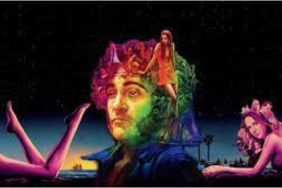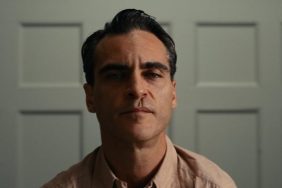Cast:
Joaquin Phoenix as Larry “Doc” Sportello
Josh Brolin as Lt. Detective Christian “Bigfoot” Bjornsen
Katherine Waterston as Shasta Fay Hepworth
Owen Wilson as Coy Harlingen
Benicio Del Toro as Sauncho Smilax
Joanna Newsom as Sortilège
Martin Short as Dr. Blatnoyd
Hong Chau as Jade
Reese Witherspoon as Deputy D.A. Penny Kimball
Jena Malone as Hope Harlingen
Sasha Pieterse as Japonica Fenway
Michael K.Williams as Tariq Khalil
Eric Roberts as Mickey Wolfmann
Maya Rudolph as Petunia Leeway
Jillian Bell as Chlorinda
Sam Jaeger as Agent Flatweed
Timothy Simons as Agent Borderline
Anders Holm Anders Holm
Elaine Tan as Xandra
Martin Donovan as Crocker Fenway
Serena Scott Thomas as Sloane Wolfmann
Yvette Yates as Luz
Madison Leisle as Goldfang
Keith Jardine Puck Beaverton
Christopher Allen Nelson as Glenn Charlock
Jeannie Berlin as Aunt Reet
Directed by Paul Thomas Anderson
Story:
In 1970 California, hippy private investigator Larry “Doc” Sportello (Joaquin Phoenix) is visited by his ex Shasta Fay Hepworth (Katherine Waterston) who tells him about the troubled affair she’s been having with a wealthy real estate developer. He soon disappears, as does Shasta. As “Doc” tries to find answers to their whereabouts, he encounters a number of disparate characters, some who try to help but many who just impede his progress, particularly the local LAPD in the form of Detective “Bigfoot” Bjornsen (Josh Brolin).
Analysis:
The thought of a master filmmaker like Paul Thomas Anderson–who up until this point could do no wrong in my book–tackling the pulpy noir films of the ’30s and ’40s in a different way, would seem like a worthy endeavor. Having already successfully given a PT Anderson twist to the classic Western and explored areas that were even harder to categorize, the filmmaker adapts Thomas Pynchon’s crime novel which transplants the often-overused noir genre into the hippy and drug culture of ’70s California.
Maybe the literate-minded will have already read Pynchon’s novel and hold it to some esteem. If you’re one of those people, then good for you. I would imagine spending days reading the novel would be more satisfying than sitting through two-and-a-half hours of Anderson’s version of it, which somehow stumbles over his “auteur”-like tendencies to create something that fails to achieve even the lowest level of what most might dub “entertainment.”
Much of my problem boils down to Joaquin Phoenix’s awkward characterization of “Doc” in bushy afro, matching sideburns and sunglasses, acting like a cross between Jeff Bridges’ The Dude in “The Big Lebowski” and Johnny Depp’s take on Hunter Thompson. I was already bored and sick of this character within less than fifteen minutes. For 90% of the movie, we watch him go around California meeting various people and having conversations about other people, who may be able to help Doc with the various cases that start piling up? but probably not. In fact, good luck figuring out exactly who or what Doc is looking for. At first, it seems to be something to do with a real estate developer having an affair with his ex, but the more Doc gets into it, the odder his encounters become, as he runs into white supremacists, cult leaders, drug dealers and harder to define combinations of the three, essentially an attempt to represent a cross-section of that era of California. (Imagine “The Big Lebowski” if it wasn’t even remotely funny or entertaining and that’s what you have left.)
“Inherent Vice” lacks any sort of coherent storytelling, at least none that could possibly maintain your interest as anything other than an experiment in how much useless information can be thrown the viewer’s way before they finally crack and say “Enough already!”
Some of the better scenes are those between Phoenix and Josh Brolin as the clean-cut hippy-hating LAPD officer nicknamed “Bigfoot,” although much of Brolin’s performance involves him yelling things at the top of his lungs or doing equally crazy things, presumably meant for laughs. (Brolin’s presence in this role just makes it more obvious that the movie isn’t even as entertaining as “Gangster Squad.”)
For the most part, actors like Michael K. Williams show up for one or two scenes and offer very little to move the story forward, instead throwing out a couple more silly-named characters that Doc may want to look into. Granted, these names come from Pynchon’s book, but there is only so seriously you can take a movie when names like “Coy Harlingen” and “Puck Beaverton” are bandied about.
One of the film’s high points is Martin Short as the head of the Golden Fang “syndicate” where Doc winds up, as he walks into the room wearing Austin Powers’ velvet suit and immediately steals the movie from under Phoenix. And just like every other character, Short is gone after five minutes. Hong Chou does stand out as a cunnilingus-obsessed masseuse named “Jade,” but she only has a couple of scenes, none that really give us much into what makes her character tick.
There are a couple of other standouts like Katherine Waterston as Doc’s ex, who actually gives the film some semblance of humanity, especially when she returns and essentially seduces Doc in one of the film’s most unforgettable sequences. But like everyone else, she’s then gone as we’re back to Doc’s incompetent attempts at finding answers to something we’re already well beyond caring about. I still have no idea who Owen Wilson is supposed to be in this movie or why we should care, and I have deliberated trying to block out the fact Benicio del Toro is in the movie.
Otherwise, the film doesn’t even have the visual flair for which Anderson has become known for as he reunites with “There Will Be Blood’s” Oscar-winning Bob Elswit, who films Doc’s encounters with the simplest of camera shots. They rarely take advantage of the California setting other than a few unimpressive beach shots. (A later scene of hippies eating pizza, configured as an homage to “The Last Supper,” seems to have very little relevance to anything else, but that’s par for the course.)
Anderson also reunites with composer Johnny Greenwood of Radiohead for the music, which is meant to combine surf music with the type of thriller-like music, maybe? The score is mixed way too low to be effective, but it really doesn’t add a lot to what is generally a lot of meaningless babble.
There just seems to be little point to any of this, almost as if Anderson deliberately sought out the most esoteric material possible to adapt, not to test himself as a filmmaker but to challenge his devout fanbase to see how much crap he can throw their way that they’ll gladly eat up and declare as another “masterpiece.” Which it’s not.
If any other filmmaker made this exact same movie, it would be considered a joke. At times, Anderson seems to be on the verge of making a movie as unwatchable as “Southland Tales,” with very little to justify the amount of time it takes to tell what is a fairly inconsequential story.
The Bottom Line:
Gruelingly dull and almost as incoherent as Joaquin Phoenix’s stoner character, “Inherent Vice” is P.T. Anderson’s most uninspired work to date and mostly a worthless waste of time.
Inherent Vice is premiering as the Centerpiece of the 52nd New York Film Festival at Lincoln Center on Saturday, October 4, before being released in select cities on December 12 and wide on January 9.
Inherent Vice
-
File_125206_0_newsommusebig

-
INHERENT VICE

-
INHERENT VICE

-
Iv 00928r

-
INHERENT VICE

-
INHERENT VICE

-
Iv 01314

-
INHERENT VICE

-
Iv 01591

-
INHERENT VICE

-
INHERENT VICE

-
INHERENT VICE

-
INHERENT VICE

-
INHERENT VICE

-
INHERENT VICE

-
INHERENT VICE

-
INHERENT VICE

-
INHERENT VICE

-
INHERENT VICE

-
Iv 02367r

-
INHERENT VICE

-
INHERENT VICE

-
INHERENT VICE

-
INHERENT VICE

-
INHERENT VICE

-
INHERENT VICE

-
Iv 03421

-
INHERENT VICE

-
INHERENT VICE

-
Iv 04148

-
INHERENT VICE

-
Iv 04269

-
Iv 04310

-
Iv 04426c

-
INHERENT VICE

-
INHERENT VICE

-
INHERENT VICE

-
INHERENT VICE

-
INHERENT VICE

-
INHERENT VICE

-
INHERENT VICE

-
INHERENT VICE

-
INHERENT VICE

-
INHERENT VICE

-
INHERENT VICE

-
INHERENT VICE

-
INHERENT VICE

-
INHERENT VICE

-
INHERENT VICE

-
INHERENT VICE

-
INHERENT VICE

-
Inherent Vice











